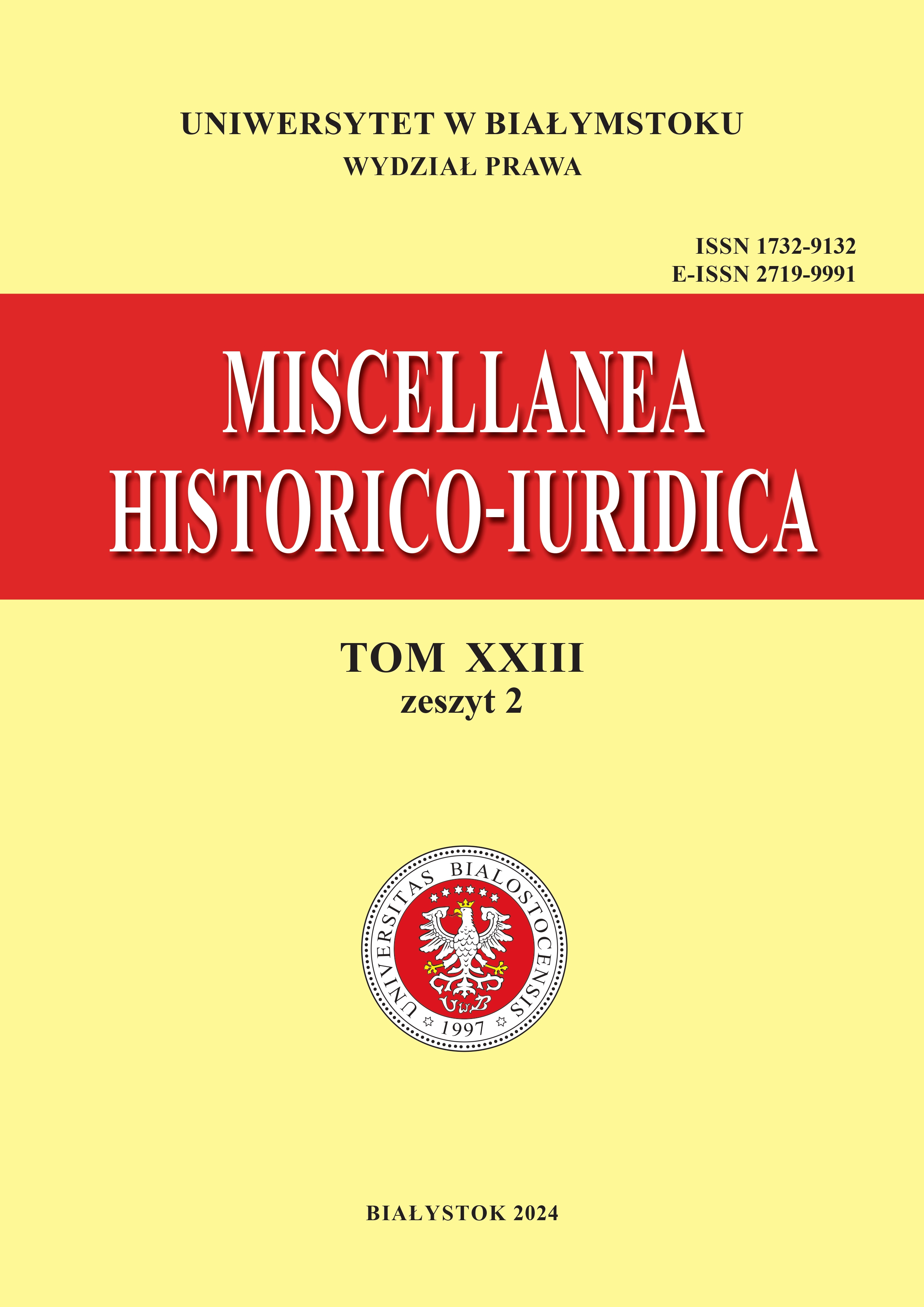The Relation Between Classical and Legal Education – the Role of Myth in Educating Lawyers
Keywords:
myth, logos, phronesis, education, law, AristotleAbstract
The purpose of this article is to explore the classical understanding of the concept of myth and its potential usefulness in legal education. Its primary objective is to show, by analysing Aristotle’s ways of obtaining knowledge, that the idea of myth (mythos) should not be viewed as contradictory to reason (logos). Rather, it can be interpreted as a practical mode of reasoning that aligns with the Aristotelian concept of phronesis. In the initial section, the concept of myth is examined in relation to logos and aletheia. They are portrayed as distinct types of knowledge positioned on opposite ends of the spectrum, with myth embodying the notion of a “golden mean” between them. This trio is then contrasted with the methods of acquiring knowledge, namely techne – phronesis – episteme. These comparisons introduce a new conceptual framework and suggest the potential application of the concept of “myth” in legal sciences by juxtaposing mythos and phronesis. Mythos represents a fluid, changeable, and relational knowledge, while phronesis represents the ways of acquiring it. For legal studies, which still predominantly align with either episteme or techne, acknowledging the novel role of knowledge presented by myth can offer an alternative framework of education and practice. This could lead to the creation of lawyers who are not solely passive (as described by Arendt), nor are the “mouth that merely pronounces the words of law” as Montesquieu desired, but rather as the phronimoi that can evaluate reasons, consider social context, deliberate well, and make thoughtful judgments and decisions that impact present-day society.
References
Arendt Hannah, The Promise of Politics, New York 2009.
Aristotle, Nicomachean Ethics, transl. H. Rackham, Cambridge–MA–London 1934.
Aristotle, Posterior Analitics, transl. G.R. G. Mure, Oxford 1928.
Bruner Jerome S., On Knowing: Essays for the Left Hand, Harvard 1979.
Ceglarska Anna, Od widza do uczestnika. rola mitu w kształtowaniu postaw obywatelskich, „Ethos” 2022, vol. 138, pp. 138–155.
Detiennne Marcel, The Creation of Mythology, Chicago 1986.
Dworkin Ronald, Law’s Empire, Cambridge, MA 1986.
Feder Lillian, Ancient Myth in Modern Poetry, Princeton 1971.
Filipowicz Stanisław, Mit i spektakl władzy, Warszawa 1988.
Graves Robert, Mity greckie, Kraków 2012.
Grimal Pierre, Mitologia grecka, Warszawa 1998.
Hesiod, Hesiod. The Homeric Hymns and Homerica, transl. H. G. Evelyn-White, Cambridge–MA–London 1914.
Homer, The Iliad, transl. A. T. Murray, Cambridge–MA–London 1919–1924.
Korczak Andrzej, Od mitu do logosu, Warszawa 2011.
Lengauer Włodzmierz., Religijność starożytnych Greków, Warszawa 1994.
Lewis Clive Staples, The Last Battle, New York 2000.
Lloyd Geoffrey E.R., Demystifying Mentalities, Cambridge 1990.
Lucian, Works, transl. A. M. Harmon, Cambridge–MA–London 1913.
Malinowski Bronisław, Mit, magia, religia, Warszawa 1990.
Martin Richard P., The Language of Heroes. Speech and Performance in the Iliad, Ithaca–London 1989.
Montesquieu Charles, The Spirit of the Laws, Cambridge 1989.
Nagy Gregory, Homeric Questions, Austin, TX 1996.
Nagy Gregory, The Ancient Greek Hero In 24 Hours, Cambridge-MA-London 2013.
Narecki Krzysztof., Logos we wczesnej myśli greckiej, Lublin 1999.
Ovid, Metamorphoses, transl. A. Golding, London 1567.
Perelman Chaim, Logika prawnicza. Nowa retoryka, Warszawa 1984.
Pindar, Odes, transl. D. A. Svarlien, 1990, https://www.perseus.tufts.edu/hopper/text?doc=Perseus:text:1999.01.0162.
Plato, Gorgias, transl. W.R. M. Lamb, Cambridge–MA–London 1967.
Plato, Philebus, transl. H. N. Fowler, Cambridge–MA–London 1925.
Plato, Republic, transl. P. Shorey, Cambridge–MA–London 1969.
Plato, Theaetetus, transl. H. N. Fowler, Cambridge–MA–London 1921.
Powell Barry B., A Short Introduction To Classical Myth, Upper Saddle River, New Jersey 2001.
Segal Charles, Słuchacz i widz, [in:] Człowiek Grecji, ed. J-P. Vernant, Warszawa 2000, pp. 221–258.
Sepkowski Andrzej, Człowiek w przestrzeni mitycznej, [in:] Mity historyczno-polityczne, wyobrażenia zbiorowe, polityka historyczna: studia i materiały. T. 1, eds E. Ponczek, A. Sepkowski, Toruń 2010, pp. 13–29.
Smolka-Drewniak Ewa, Kobieta, polis i boskość w tragediach Eurypidesa: antropologiczne, aksjologiczne i estetyczne aspekty kobiecości, Nysa 2011.
Świderkowna Anna, Bogowie zeszli z Olimpu, Warszawa 1991.
Taplin Oliver, Greek Tragedy in Action, London–New York 2003.
Aristotle, Metaphysics, transl. H. Tredennick, Cambridge–MA–London 1933.
Trzcińska Izabela, Logos, mit i ratio: wybrane koncepcje racjonalności od XV do XVII wieku, Kraków 2011.
Vidal-Naquet Pierre., Vernant Jean-Pierre, Brisson Jean-Paul, Brisson Elisabeth, Zrozumieć demokrację i obywatelskość, Warszawa 2007.
Downloads
Published
Issue
Section
License
Copyright (c) 2024 Miscellanea Historico-Iuridica

This work is licensed under a Creative Commons Attribution-ShareAlike 4.0 International License.







